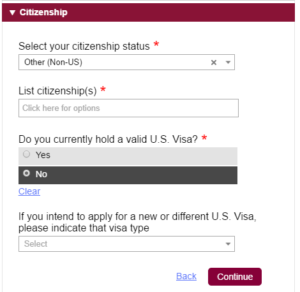A Guide to the Citizenship Section of the Common App (Can I Still Get Into College if I’m Undocumented?)
If you’ve read any of our posts on the CollegeVine blog about the Common Application (including How to Write the Common Application Essays 2017-2018), you know that the Common App asks for a great deal of information about every aspect of your life. Along with questions about your contact information — your postal address, phone number, email, and so on — you’ll need to provide information about your citizenship status.
For applicants who are citizens of the United States, answering these questions is usually fairly simple. However, if you’re an applicant who is also legally considered an undocumented immigrant to the U.S., your situation is more complicated. You may be concerned about whether you’ll be able to attend college in the U.S. at all, regardless of your academic qualifications and extracurricular achievements.
If you’re an undocumented student, you’re not alone. Each year, it’s estimated that around 65,000 students like you graduate from high schools in the U.S., and plenty of those students would like to attend college.
Legally speaking, there is no federal or state law preventing undocumented students from attending college in the U.S. Individual colleges and college systems (such as state college systems) are allowed to have their own policies prohibiting undocumented students from being admitted to their schools, but most colleges do not have policies of this nature.
When most colleges in the U.S. will admit undocumented students, why do colleges need to know about your citizenship in the first place? We’ll go over the answer to that question in greater detail below, but briefly, citizenship status can determine whether you’re considered a domestic or an international student, which often has a large impact upon what financial aid options you’ll be eligible for. This is relevant both to the college, in terms of awarding your financial aid package, and to you, in terms of deciding whether you can afford to attend a particular college.
As an undocumented high school student considering applying to college, you’ll need to understand the federal, state, and school-specific policies that will determine how your citizenship can affect your application. Read on for an overview of how the issue of citizenship is addressed on the Common App, what information you’ll need to provide on the Common App about your citizenship status, and how being an undocumented student might impact you in the realm of college admissions.
Why do colleges ask for my citizenship information on the Common App?
First of all, a few colleges do specifically prohibit undocumented students from attending as a matter of policy. However, policies of that nature are quite uncommon, and they’re just that — school policies — rather than state or federal laws. If you’re worried about the practices of a college to which you’d like to apply, ask the admissions office. (If divulging your citizenship status in this way makes you uncomfortable, you can always call the admissions office and ask about general policies without giving your name.)
Colleges are generally not interested in making admissions decisions based directly upon citizenship, but they do have reasons to be informed about your citizenship status before they make an offer of admission. For the most part, these reasons have less to do with admissions and more to do with how you’ll pay for college.
In some cases, where you live can affect how much you’ll be charged to attend college. Namely, at state schools, students who reside within that state typically pay less in tuition than students who come from out of state. However, different states differ in whether they allow undocumented students currently living in that state to access in-state tuition.
If you’re an undocumented student considering a state school, it’s worth looking into your state’s regulations on this issue before depending upon in-state tuition. (You can view some additional recent history on in-state tuition policies for undocumented students from the National Conference of State Legislators.)
Your citizenship status also controls what kinds of financial aid you’re eligible to receive. While not everyone needs help paying for college, clearly, for those who do, it can be a very important factor in your college decision. In particular, your citizenship determines whether you’ll be eligible for the financial aid programs offered directly by the federal government of the United States.
Federal student aid eligibility is determined through the Free Application for Federal Student Aid, better known as the FAFSA. This aid includes particular grants such as the Pell Grant, particular loans such as William D. Ford Federal Direct Loans, and the Federal Work-Study program. You can check out the U.S. Department of Education’s Federal Student Aid website for more information about what does and doesn’t count as federal student aid.
In order to fill out the FAFSA, you’ll need to have been issued a Social Security number. Social Security numbers are assigned to U.S. citizens and to some eligible noncitizens, such as permanent residents who have a green card. Some undocumented students may have DACA status, which refers to a particular federal immigration policy under which undocumented youths can receive a Social Security number. Students with DACA status can fill out the FAFSA.
The bottom line is that in the current system, without a Social Security number, undocumented students have no way to fill out the FAFSA and therefore cannot apply for federal student aid. Colleges ask for your citizenship status on the Common App primarily to determine whether you’ll be eligible for that federal financial aid.
When it comes to financial aid from sources other than the federal government, things get a bit more complicated. As an undocumented student, you may be eligible for financial aid that comes directly from the state in which you reside, but policies vary. You may also be eligible for financial aid that comes directly from your college or from private sources. We’ll discuss this in greater detail later in this post.
In case you’re worried about reporting your undocumented status to colleges, keep in mind that under the Federal Education and Privacy Act (FERPA), colleges are not permitted to disclose your citizenship status to anyone, including immigration authorities. You should fill out your college applications accurately and honestly. If you don’t, you risk having any acceptances rescinded when your college finds out — not because you’re undocumented, but because you put down inaccurate information on your application.
Which citizenship status do I select?
When you’re ready to enter your citizenship information into the Common App, you’ll need to log in, open up your Common App tab, navigate to the Profile section, and click on “Citizenship.” (For more background on how to use the Common App’s online interface, check out the CollegeVine blog post A User’s Guide to the Common Application.)
Once you click on “Citizenship,” you should see the following question:
First, you’ll select your citizenship status from the available options in the drop-down menu. Then you’ll be prompted to answer additional questions, depending on your response. Below, we’ll go over what each of these options means.
- U.S. Citizen or U.S. National: Choose this option if you were born in the U.S., Puerto Rico, Guam, the U.S. Virgin Islands, American Samoa, or Swains Island; if you are a naturalized U.S. citizen; or if you were born abroad, but one or both of your parents is a U.S. citizen. If you choose this option, you’ll be prompted to provide your Social Security number.
- U.S. Dual Citizen: Choose this option if you meet any of the conditions to be a U.S citizen or U.S. national, as listed above, and you are a citizen of another nation as well. (Conditions for citizenship will vary from country to country.) If you choose this option, you’ll be prompted to provide your Social Security number as well as your country or countries of citizenship.
- U.S. Permanent Resident: Choose this option if you are not a U.S. citizen or a U.S. national, but you are a green card holder and legally allowed to reside in the U.S. If you choose this option, you’ll be prompted to answer additional questions. You’ll need to provide your Social Security number, your country or countries of citizenship, a copy of your green card, your Alien Registration Number (ARN), and your ARN expiration date.
- U.S. Refugee or Asylee: Choose this option if you have been legally granted official refugee or asylee status by the U.S. (an asylee is a person who has requested or received asylum.) If you choose this option, you’ll be prompted to provide your Social Security number and your country or countries of citizenship.
- Other (Non-U.S.): Choose this option if you are a citizen of a nation or nations not including the U.S., or if you are an undocumented student, including if you have been granted DACA status. If you choose this option, you’ll be prompted to answer additional questions. We’ll go over how to answer these questions in the next section of this post.
It’s important that you answer this question accurately. If for any reason you’re unsure about your official citizenship status, you can start by talking to your parents or guardians.
If I am an undocumented student, how do I fill out the Citizenship section?
As we indicated above, if you are an undocumented student, you will answer the first question in the Citizenship section by selecting “Other (Non-US)” from the drop-down menu. Once you do that, the screen will look like this:
Where the Common App asks you to “List Citizenship(s),” choose the name(s) of the country or countries of which you are a legal citizen. Choose “No” for the “Do you currently hold a valid U.S. Visa?” question.
The next question will ask you “If you intend to apply for a new or different U.S. Visa, please indicate that visa type.” If this question applies to you, you can select an answer; otherwise, don’t answer it.
Again, it’s important this section be filled out correctly, so if you’re at all unsure about your citizenship status, check your information before you fill out this form.
How does my citizenship status affect my application?
As we went over, your citizenship status can in some cases impact colleges’ admissions decisions. For the most part, however, the main impact of your citizenship status will be on your financial aid options. Obviously, not everyone requires financial aid to attend college, but for the many student who do, financial aid availability can have a huge impact on shaping your college plans.
When you apply to a number of colleges as an undocumented student living in the U.S., these colleges may differ in how they consider your application and how they group you as a student. Some colleges may consider you an international applicant because you’re a citizen of a country other than the U.S.; if they do, you’ll be subject to any regulations that the college enforces for international applicants. Others may consider you a domestic applicant, in which case you’ll be treated more like applicants who are U.S. citizens.
Contact the colleges you’re interested in for more details about how they’ll consider your application. Again, if you’re concerned about privacy, remember that it’s perfectly possible to call and ask about general admissions and financial-aid policies without giving your name, and that colleges are not permitted to release your citizenship information to the authorities.
As we noted, undocumented students without Social Security numbers are not eligible for federal student aid. Undocumented students may be eligible for government-provided financial aid at the state level; it depends which state you live in and which college you attend, so you’ll need to check with your state and your school for their policies. However, state financial aid is not available to undocumented students who are being considered for admission as international students.
Institutional financial aid — that is, financial aid that is awarded directly by the college you’re attending — is often available to students regardless of citizenship status. You may be able to receive institutional financial aid as an undocumented student living in the United States, regardless of whether you’re eligible for state and/or federal aid. This is especially true if a particular college considers you a domestic applicant.
However, if you’re being considered an international student, a different set of policies may apply to you. This can affect not only what financial aid you can receive, but how your financial need is considered when making admissions decisions.
First of all, some colleges simply do not offer institutional financial aid to international students for various reasons (usually budgetary). Check your chosen schools’ financial aid websites and/or resources for international students to determine whether international students are eligible for institutional financial aid.
This policy may or may not be a deal-breaker for you when you’re considering a particular college. If you have the resources to pay for college without assistance from institutional financial aid, you may still decide to apply as an international student. However, it’s definitely something you should find out about before you submit any applications.
Second, admissions policies may differ if you are applying as an international student. We at CollegeVine have previously talked about the difference between need-blind and need-aware admissions policies. In brief, these terms refer to whether a college takes your financial need into account when deciding whether to make you an offer of admission.
In a need-blind system, financial need has no impact (positive or negative) on the admissions process. The people who consider your admissions application will not even have access to your financial aid application. In a need-aware system, financial need may impact admissions decisions. This means that the admissions committee will see your financial information, and might decide not to offer you admission on the basis of the financial assistance you’ll need to attend their school.
How is this relevant to undocumented applicants? At some schools, the admission of domestic applicants is need-blind, but the admission of international applicants is need-aware. If you’re an undocumented student applying as an international student, this can obviously affect whether that school is a practical choice for your budget. Check with your chosen schools’ admissions offices to find out what their exact policies are for domestic versus international students.
Remember that whether a school’s admissions process is need-blind or need-aware doesn’t determine how much financial aid you might receive. The admissions process might be need-blind, and you might be admitted regardless of your financial need, but the school might not actually offer you enough aid to make attendance possible for you.
Some colleges, whether need-blind or need-aware, guarantee to meet 100% of the demonstrated financial need of admitted students; however, most colleges don’t. Some colleges guarantee to meet the full demonstrated need of domestic applicants, but not international applicants. Various combinations of policies are possible. It totally depends on the school and the decisions made by that school’s financial-aid office, so again, you’ll need to check in with each school you’re interested in before you begin the application process.
Financial aid that comes from privately-run scholarship programs or similar sources, of course, is governed primarily by whatever rules have been established by the people who run that scholarship. There are scholarships that are restricted to U.S. citizens, and scholarships that are open to everyone. There are even scholarships that are specifically intended to assist undocumented students. When you consider outside scholarships, you’ll need to go over their requirements carefully to determine whether they’re right for you.
If you’re an undocumented student, your citizenship status will inevitably have some impact upon your college application process. You’ll need to allow yourself extra time to research the policies of individual schools you’re interested in, and your financial aid eligibility will most likely be affected as well. Many parts of your application experience will vary based upon which schools you apply to, and that can get confusing — for example, if one school considers you a domestic applicant while another considers you an international applicant.
These issues are significant and shouldn’t be underestimated. However, don’t let anyone tell you that you simply can’t apply to colleges in the U.S. because of your citizenship status. Being undocumented will present you with additional hurdles in the college application process, but it doesn’t exclude you from pursuing your academic dreams.
Deadlines are approaching — are you ready? CollegeVine can help with everything from crafting personal essays to planning application strategies to choosing a college that’s a great fit for you!
Still have questions about filling out the Common Application? Check out our blog post How to Write the Common Application Essays 2017-2018.
Want help with your college essays to improve your admissions chances? Sign up for your free CollegeVine account and get access to our essay guides and courses. You can also get your essay peer-reviewed and improve your own writing skills by reviewing other students’ essays.





